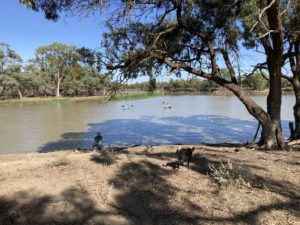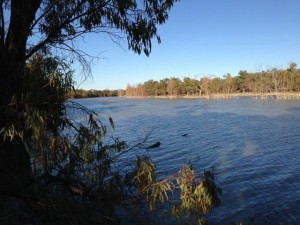How do we value the Environment?

I know intrinsically everyone values the environment, that is something that we have wonderful personalities such as David Attenborough to thank for making us all more aware. What I’m talking about is at a much more basic level, we value our property, our house, our car, even our time, so what value do we place on the wonderful bushland where you walk through nearby? Or the array of native parrots that fly overhead calling to their mates?
Our property is in South West NSW, with our house adjacent to the Anabranch/Talyawalka River (Part of the Lower Darling River). Water normally flows into the river from either Darling River floods or controlled managed flows from the Menindee Lakes scheme. The current flow is a combination of a managed flow out of Lake Cawndilla and an overland/spill flow from the Darling/Baaka.
The specific issue that I wish to discuss is there have been a couple of recent opportunities to deliver a small flood to the lower Darling River (Between Menindee Lakes and Wentworth) in order to water more of the floodplains and deliver a wonderful fish breeding/feeding event (Not to mention all the trees and plants that are watered!) that the area really needs after large sections dried up in 2019. Every centimetre increase in river height over the high flow level of approx. 18,000mgl/day results in more floodplain inundated, more trees and plants watered, more food for river life, fish, frogs, yabbies, turtles etc.
Unfortunately, a decision by Water NSW was unable to happen due to the State Emergency Services (SES) expressing concerns about possible inundation of some river shacks and potential property damage. I express no ill feeling towards anyone in the SES, in fact if I was in their position and could be held accountable for property damage, then I may well have made a similar decision. The ruling is that if “we can mitigate a flood we must mitigate a flood”. The question that I have is; “why do we say that our man made property trumps the environment every time, then we are left trying to repair our precious environment?” I reckon we need a much more balanced perspective on issues such as this, especially if we are to turn around the decline in our inland rivers and streams.
The risk seen in the above example was damage to property, what wasn’t reconciled was impact to the environment by not taking this missed opportunity. How would we cost out the impact to the flora and fauna in the riverine environment, especially those that directly benefit from the floodplains? You will note that I talk about the river and the floodplains, they are two parts of the one system; The river is the main channel and is the critical habitat when there are low or no flows. Then there is the floodplains where all the food is generated, the signal to breed is when the rivers spill into the floodplains, so important to not miss these breeding and watering opportunities.
I’m a farmer and I consider myself a proud caring one, it is fantastic that we are beginning to account for important issues such as biodiversity, carbon and Natural Capital. That is much more accurately accounting for the impact food and fibre production can have on the environment, good and bad. Every action has a reaction, there are winners and losers in every decision we make, the aim of resource managers is to maintain or preferably build that resource over their time. As decision makers, managing a water storage is no different. This is a component of a larger river system and the aim must be to improve the whole riverine corridor, while delivering water to the communities along the river.
In the last couple of months there has been significant flooding through many communities, especially near the coast in NSW and QLD. What impact has town and community planning had on river flows in these areas? What impact has management of farming land had on the infiltration of water into the soil? Are the impacts of these actions even accounted for? Was the value to the environment of the flood actually recognised, the fish breeding opportunities? Many questions that if we are to genuinely take our environment seriously, I reckon we need to address.
In closing I reckon we need to make our decisions around water management more complex, better communicated and more transparent. Our inland regional communities rely on these rivers, the lifeblood of the area, for economic, social and cultural reasons. The Indigenous people in our area, the Barkindji People refer to the Darling River as the “Baaka”, to them it was the lifeblood. Our culture has only been here 230 odd years and I hope we are starting to learn that.


Hi Gus, flood plains are called flood plains for a reason other wise they are deserts. I agree that the decisions need to focus on prioritizing the enhancement of particularly the brittle ones that you refer, when opportunities are rare. There have got to be simple ways of protecting a few man made buildings.
Thanks Graeme, I agree re protecting the buildings, also we need to recognise and acknowledge the cost of managing a flood out of the system. With regulation there will always need to be compromises as we are storing water for future dry times, we need to accurately acknowledge the impact, we can then make well thought out decisions.